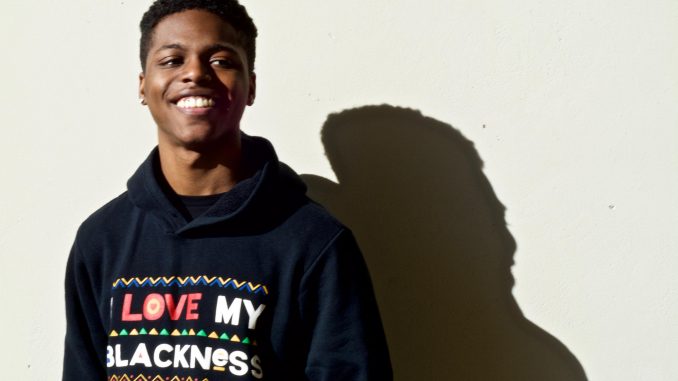
When he was in third grade, Jamal Parker started writing comic books. He mimicked some of his favorites: Spider-Man, Superman and the Justice League.
The sophomore African American studies major stuck exclusively to writing fiction for awhile, and he shied away from other forms of writing.
Parker, now the Philly Youth Poetry Movement’s slam champion, said he was initially uninterested in poetry.
“I wanted to stick to fiction writing,” Parker said. “This creative drive I had came from being invested in superheroes.”
Parker didn’t consider writing poetry until he took his first poetry class in high school, where he said he tried performing spoken word for the first time.
“It wasn’t even my own poem,” Parker said. “But reciting it felt dope.”
Parker’s poetry teacher pushed him to start writing his own work. From there, he started going to open mics, workshops and other venues.
“That spawned this spoken word endeavor that I’ve taken on,” Parker said.
Parker writes poetry several times a week. He is the secretary for the Babel Poetry Collective, and his team was named the Brave New Voices’ International Youth Poetry Slam Champion last summer.
When he was a freshman, Parker auditioned for Babel, but he didn’t make it.
“I was nervous, but I thought I’d be able to make it,” he said. “It just pushed me to go harder.”
After seeing Babel’s October 2014 show “Babylon Rise,” Parker’s mind was set. Next year, he wanted to make the team.
“I wanted to be at that level,” he said. “I wrote every day. I started to reflect on what I had to do better.”
“I continue to write so that I can avoid complacency,” Parker said.
As a sophomore with the Brave New Voices win under his belt, Parker went out for Babel’s collective auditions once again. This time, he made it.
Parker said poetry has become like a full-time job. He’s inspired by his own personal experiences and his education, especially his African-American studies courses.
“What you hear from African-American poets comes from identity,” Parker said.
His poems “wouldn’t be as intricate or detailed” without the inclusion of his experiences as an African American, he added.
Parker said the last poem he performed at Brave New Voices, “Glory,” focused on the idea of “black joy,” which celebrates African-American culture, rather than what Parker said is a more typical narrative: the victimization of African Americans.
“We wanted to flip the script,” he said.
Though the group had more serious poems that were performance-ready, they chose to “end the night on a high note.”
After the event, Parker said social media lit up with #blackjoy in relation to the event.
“Poetry is most rewarding when it can spark a movement,” Parker said. “It allows people to feel empowered.”
Dagmawe Berhanu, a sophomore psychology major and a member of Babel, said Parker’s stage presence as a poet motivates him.
“His energy is alive, electric,” Berhanu said. “It makes you want to listen.”
“We’re a family,” he added. “We’re constantly pushing each other, trying to get to our highest peak. … He takes his craft seriously, and it’s a testament to his passion for the artistic process.”
Parker said when reflecting on his growth from doodling comic books in the third grade until now, the one thing that continually motivates him to write is the power of his words.
“It’s not always about the medals or awards,” Parker said. “When a poem changes a person’s point of view, you realize that it’s not just about the credit.”
Paula Davis can be reached at paula.davis@temple.edu.


Be the first to comment